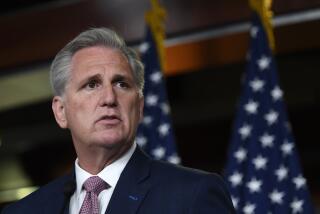Mitchell Links Capital Gains Levy Cut, Tax Hike on Rich
- Share via
WASHINGTON — With tax increases looming on the agenda of budget talks between White House and congressional negotiators, Senate Majority Leader George J. Mitchell (D-Me.) said Wednesday that--if the deficit-reduction package includes a cut in capital gains taxes--he will insist on raising the income taxes of the rich.
Mitchell said that, since the wealthy would be the primary beneficiaries of cuts in the tax on profits from capital asset sales, the break they would get should be tempered by an increase in the top marginal tax rate from 28% to 33%.
His stand, outlined to reporters, may foreshadow a deadlock over taxes during the budget talks, since Republican participants have declared their strong opposition to any increase in income tax rates.
Sen. Bob Packwood (R-Ore.), for example, has said that raising marginal tax rates would be “unacceptable.” He has proposed higher energy taxes as one way to increase revenue. Other Republicans have advocated raising taxes on liquor and cigarettes as a last resort.
Mitchell’s comments came as the negotiators appeared to come to an impasse, with both Republicans and Democrats hesitating to put forward a package proposal--including tax increases--in hopes that the other side would move first.
“There are certain points beyond which I will not go,” Mitchell said. He emphasized that he rejected suggestions that the top tax rate be raised to 31% or 32% as part of a deal that would cut the capital gains tax, which is favored strongly by President Bush.
“In the past decade the federal tax system has become increasingly regressive,” the Democratic leader added.
“In effect, the middle class is increasingly shouldering the burden of taxation. . . . The very wealthy have received an enormous benefit,” he said. “I don’t see how anyone can in good conscience further that trend.”
In other budget-related matters Wednesday, the Senate Armed Services Committee went along with the Administration’s request to spend $3.5 billion in the next fiscal year for the B-2 Stealth bomber, which is produced in Southern California.
Committee members appeared to support a revised Administration plan to build 75 of the $815-million-a-copy bombers, rather than the originally envisioned fleet of 132.
However, the committee voted to cut nearly $1 billion from the Administration’s request for the “Star Wars” anti-missile program. The committee’s plan would leave funding at this year’s level of $3.5 billion.
Some lawmakers warned that the controversial program faces further cuts when it reaches the Senate floor later this month and when the more skeptical House takes up the defense spending bill in September.
A key Senate aide called the $3.5-billion “Star Wars” figure a “pipe dream” that is certain to come down before the Pentagon spending bill is finally approved later this year.
Meanwhile, in a news conference related to the budget talks, several moderate Democrats declared their opposition to any tax increases that would have the greatest impact on middle-income Americans.
Led by Sen. John B. Breaux (D-La.) and Rep. Dave McCurdy (D-Okla.), the Democratic Leadership Council said that the greatest burden of tax changes enacted now should fall on the upper-income groups.
More to Read
Get the L.A. Times Politics newsletter
Deeply reported insights into legislation, politics and policy from Sacramento, Washington and beyond. In your inbox twice per week.
You may occasionally receive promotional content from the Los Angeles Times.









